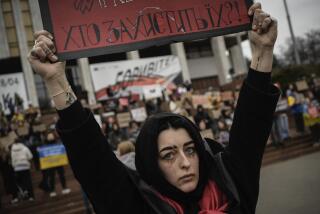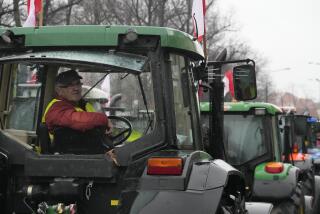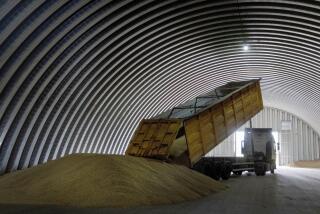Polish Pilots Get Call to Rescue Kurdish Crops
- Share via
BAGHDAD, Iraq — Seven Polish pilots will fly Iraqi helicopters today on a mission of compromise over the Kurdish regions of the north.
The flight of crop dusters marks a crucial step in bridging political and humanitarian imperatives in the refugee crisis. It wasn’t easy.
Prince Sadruddin Aga Khan, the top U.N. official for delivering relief to an estimated 1.5 million Kurdish refugees, most of them hungry and many sick, told reporters here in the Iraqi capital that in this case, humanitarian concerns overrode political ones.
“I was able to get the green light from the powers that be to get the crops sprayed in the north” before pests devour the wheat, he said.
His problem lies in the complex web of postwar authorities in Iraq, and the race against the summer sun to ease the suffering of the refugees. Relief agencies operate in the face of restrictive U.N. sanctions against Iraq, Kurdish fears against Iraqi reprisals and Baghdad’s opposition to what it terms outside interference in its internal affairs.
Sadruddin treads a difficult path. Postwar sanctions of the U.S.-led coalition forces have forbidden Iraqi pilots to operate over the Kurdish region, so the Polish fliers, who will pilot Iraq’s Polish-made crop-dusting choppers, got the call. Inspectors from the U.N. Food and Agriculture Organization were brought in to assure that the helicopters carry pesticide and not poison gas, Sadruddin said--Iraq is known to have used gas against part of its Kurdish minority during the Iran-Iraq War.
And permission came just in time. Loss of the $350-million wheat crop would mean that the United Nations would have to ship in food for the Kurds at far greater cost.
Sadruddin, who Monday took a helicopter himself to inspect U.N. relief operations in the northern cities of Mosul, Dahuk and Zakhu, where he was scheduled to meet U.S. military officials, told reporters Sunday night: “There is such a thing as sanctions, and as an international U.N. representative, I have to respect them . . . (but they) should not impede the humanitarian requirements.”
Food, he said, is one area “where we somehow have to trim the edges of the sanctions to cover the humanitarian needs.”
On Sunday, Deputy Prime Minister Tarik Aziz said Iraq welcomes U.N. humanitarian aid but “rejects all dubious attempts to exploit the problem of refugees for political purposes that undermine Iraq’s sovereignty.” He repeated Baghdad’s contention that the presence of U.S. and other foreign forces in northern Iraq compounds the country’s problems.
A political solution to the crisis has been under negotiation here in Baghdad for the past week in the second round of talks between Iraqi and Kurdish leaders on autonomy for the beleaguered people who make up one-fifth of the Iraqi population.
More to Read
Sign up for Essential California
The most important California stories and recommendations in your inbox every morning.
You may occasionally receive promotional content from the Los Angeles Times.










